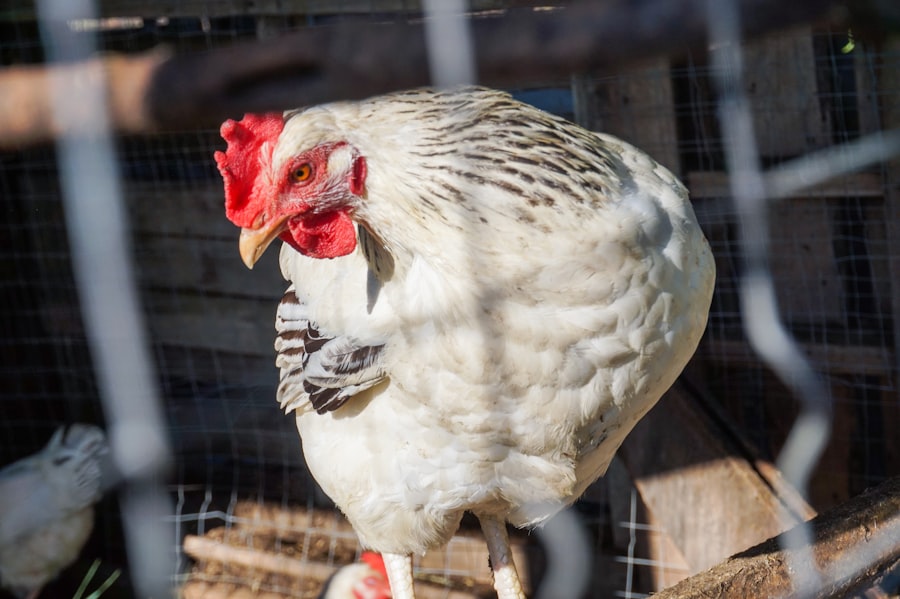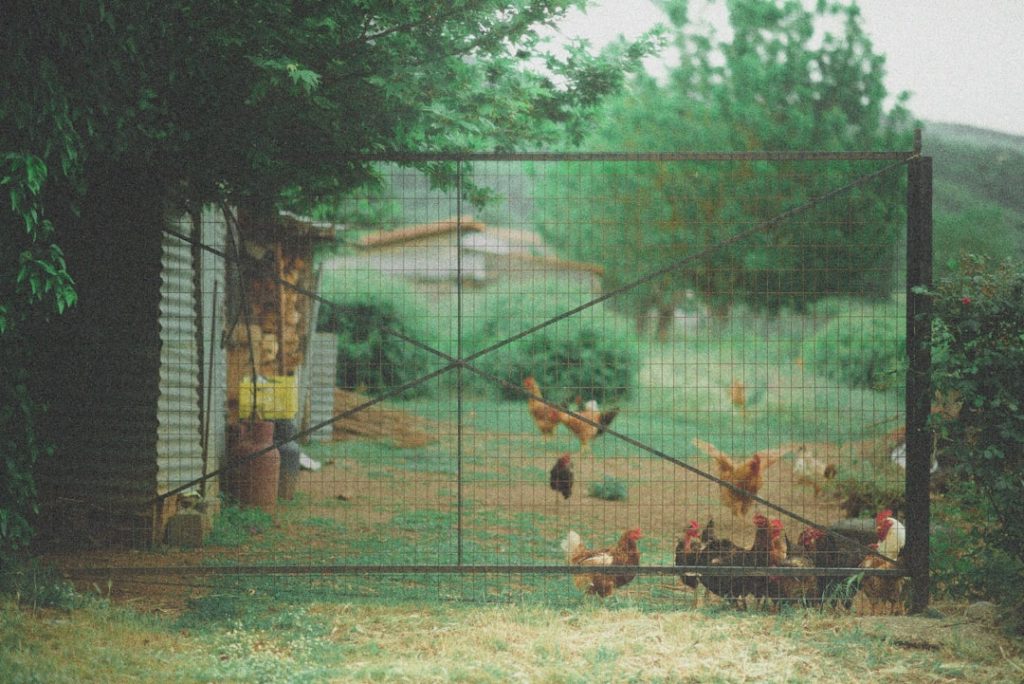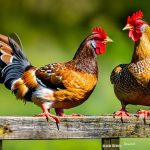When selecting a chicken breed for a backyard flock, several factors should be considered. Climate is a crucial element, as some breeds are better adapted to cold weather, while others thrive in warmer conditions. The intended purpose of the flock is also important, whether it’s for egg production, meat production, or both.
Some breeds are known for their high egg-laying capacity, while others are valued for their meat quality. Temperament is another significant factor, especially for families with children or other pets. Docile and friendly breeds are often preferred in these situations.
Available space is also a consideration, as some breeds are more suitable for confined areas, while others require more room to roam. The size of the bird is an additional aspect to consider. Larger breeds like Jersey Giants or Brahmas are typically raised for meat production, providing substantial yields.
Smaller breeds such as Leghorns or Easter Eggers are known for their prolific egg-laying abilities. Egg color can also be a factor in breed selection. Some breeds, like Ameraucanas or Araucanas, lay eggs in various shades of blue and green, adding diversity to egg collections.
Ultimately, the ideal breed choice depends on individual needs, preferences, and specific circumstances. Thorough research into different breeds is recommended to ensure the best fit for one’s lifestyle and flock objectives.
Table of Contents
- 1 Setting Up a Coop and Run
- 2 Feeding and Watering
- 3 Health and Hygiene
- 4 Collecting and Storing Eggs
- 5 Processing Chickens for Meat
- 6 Tips for Raising Happy and Healthy Chickens
- 7 FAQs
- 7.1 What are the benefits of keeping chickens for eggs and meat?
- 7.2 What do chickens need to thrive and produce eggs and meat?
- 7.3 What breeds of chickens are best for egg production?
- 7.4 What breeds of chickens are best for meat production?
- 7.5 How can I ensure the chickens are healthy and well-cared for?
- 7.6 What is the process for harvesting eggs and meat from chickens?
Key Takeaways
- When choosing a breed, consider factors such as egg production, temperament, and climate adaptability
- Set up a secure coop and run to protect chickens from predators and provide adequate space for exercise
- Provide a balanced diet and clean water to ensure the health and productivity of your chickens
- Regularly monitor and maintain the hygiene of the coop and chickens to prevent diseases and parasites
- Collect eggs daily and store them properly to maintain freshness and quality
Setting Up a Coop and Run
Coop Considerations
When building or buying a coop, there are a few key factors to consider. First and foremost, you’ll want to make sure that the coop is large enough to comfortably accommodate your flock. As a general rule of thumb, each chicken should have at least 2-3 square feet of space inside the coop. Additionally, make sure that the coop is well-ventilated to prevent moisture buildup and ensure good air quality for your birds. It’s also important to provide roosting bars for your chickens to perch on at night, as well as nesting boxes for them to lay their eggs.
Creating a Secure Outdoor Run
In addition to a coop, it’s important to provide your flock with a secure outdoor run where they can stretch their legs and forage for bugs and plants. When setting up a run, make sure that it is enclosed on all sides and covered with wire mesh to protect your chickens from predators. You’ll also want to provide plenty of shade and shelter within the run, as well as access to fresh water and food.
Adding Enrichment Items
Finally, consider adding some enrichment items, such as perches, dust baths, and hanging treats, to keep your chickens entertained and engaged. By providing a well-designed coop and run for your flock, you can ensure that they have a safe and comfortable home where they can thrive and flourish.
Feeding and Watering

Feeding and watering your backyard flock is an essential part of keeping them healthy and happy. When it comes to feeding, it’s important to provide your chickens with a balanced diet that meets all of their nutritional needs. A good quality commercial feed is a great foundation for their diet, but it’s also important to supplement with fresh fruits and vegetables, as well as kitchen scraps and garden trimmings.
Additionally, consider offering your chickens access to grit and oyster shells to help with digestion and eggshell production. It’s also important to provide access to fresh, clean water at all times. Make sure that your waterers are kept clean and free of debris, and consider adding some apple cider vinegar to the water to help promote good gut health in your flock.
In addition to providing a balanced diet, it’s important to monitor your chickens’ feeding habits and adjust their diet as needed. For example, during molting season or times of increased egg production, your chickens may require additional protein in their diet. Similarly, during hot weather, it’s important to provide extra hydration and electrolytes to help keep your flock cool and healthy.
By paying attention to your chickens’ feeding and watering needs, you can ensure that they have everything they need to thrive and stay in peak condition.
Health and Hygiene
Maintaining the health and hygiene of your backyard flock is essential for keeping them happy and productive. One of the most important aspects of chicken health is disease prevention. Make sure that your chickens are vaccinated against common diseases such as Marek’s disease and Newcastle disease, and keep an eye out for any signs of illness or injury in your flock.
Additionally, it’s important to practice good biosecurity measures to prevent the spread of disease within your flock. This includes quarantining new birds before introducing them to your existing flock, as well as regularly cleaning and disinfecting your coop and equipment. In addition to disease prevention, it’s important to practice good hygiene when handling your chickens.
Wash your hands thoroughly before and after handling your birds, and consider wearing dedicated footwear when entering the coop or run to prevent tracking in dirt or pathogens from outside. It’s also important to keep your coop clean and well-maintained to prevent the buildup of bacteria and parasites. Regularly clean out bedding material, such as straw or wood shavings, and consider adding diatomaceous earth or other natural pest control methods to help keep mites and lice at bay.
Collecting and Storing Eggs
Once your chickens start laying eggs, it’s important to establish a routine for collecting and storing them properly. When collecting eggs from the nesting boxes, make sure to handle them gently to prevent cracking or breaking. It’s also important to collect eggs frequently throughout the day to prevent them from getting dirty or damaged by other hens in the nest.
Once collected, store eggs in a cool, dry place away from direct sunlight. It’s best to store eggs with the pointed end down to help maintain their freshness. When it comes to storing eggs long-term, there are a few different methods you can use.
One option is to refrigerate fresh eggs in their cartons, which can help extend their shelf life by several weeks. Another option is to coat eggs in mineral oil or store them in a container filled with a water-glass solution to preserve them for several months. Regardless of the method you choose, it’s important to regularly check stored eggs for signs of spoilage or deterioration, such as off odors or changes in texture or appearance.
By following these guidelines for collecting and storing eggs, you can ensure that you have a steady supply of fresh, high-quality eggs from your backyard flock.
Processing Chickens for Meat

Processing Options
When the time comes to process your birds, you have several options to choose from. You can take them to a professional processor who can handle the job for you. Alternatively, you can process them yourself at home using manual or mechanical processing equipment.
Pre-Processing Preparations
Regardless of the method you choose, it’s essential to handle the birds gently and respectfully throughout the process. Before processing your chickens, make sure they have been properly fasted for at least 12 hours to empty their digestive tracts. This will help reduce the risk of contamination during processing.
Post-Processing Care
Once processed, it’s crucial to chill the birds quickly to prevent spoilage. You can do this by placing them in an ice water bath or refrigerating them immediately after processing. Finally, consider packaging the meat in vacuum-sealed bags or freezer-safe containers for long-term storage.
Tips for Raising Happy and Healthy Chickens
Raising happy and healthy chickens is not only beneficial for the birds themselves but also for those who care for them. One way to ensure that your chickens are happy is by providing them with plenty of space both inside their coop and in their outdoor run. This will allow them to move around freely and engage in natural behaviors such as scratching and dust bathing.
Additionally, providing enrichment items such as perches, hanging treats, and dust baths can help keep your chickens mentally stimulated and entertained. Another important aspect of raising happy chickens is socialization. Spend time with your birds regularly, talking to them and offering treats by hand.
This will help build trust between you and your chickens and can make handling them easier in the long run. Additionally, consider introducing new birds gradually into an existing flock to minimize stress and aggression among the birds. In terms of health, it’s important to monitor your chickens regularly for any signs of illness or injury.
This includes checking their eyes, comb, wattles, feet, and feathers for any abnormalities or signs of parasites. Additionally, make sure that your chickens have access to fresh water at all times and provide them with a balanced diet that meets all of their nutritional needs. By following these tips for raising happy and healthy chickens, you can ensure that your backyard flock thrives and provides you with years of enjoyment and productivity.
If you’re interested in learning more about how to keep chickens for eggs and meat, you might want to check out this article on chicken coop design in Grand Island, NE. It provides valuable information on creating a suitable environment for your chickens to thrive and produce high-quality eggs and meat. Additionally, you can visit poultrywizard.com for more tips and resources on raising chickens for eggs and meat.
FAQs
What are the benefits of keeping chickens for eggs and meat?
Keeping chickens for eggs and meat can provide a sustainable source of high-quality protein. Chickens also help control pests in the garden, provide natural fertilizer, and can be a source of income through selling eggs and meat.
What do chickens need to thrive and produce eggs and meat?
Chickens need a secure and spacious coop, access to fresh water, a balanced diet of feed, and a suitable outdoor area for foraging. They also require protection from predators and regular health checks.
What breeds of chickens are best for egg production?
Some popular breeds for egg production include the Rhode Island Red, Leghorn, and Australorp. These breeds are known for their high egg production and reliability.
What breeds of chickens are best for meat production?
Breeds such as the Cornish Cross, Freedom Ranger, and Red Ranger are commonly used for meat production due to their fast growth and high meat yield.
How can I ensure the chickens are healthy and well-cared for?
Regularly clean the coop, provide a balanced diet, monitor for signs of illness, and seek veterinary care when needed. Additionally, ensure the chickens have access to clean water and a suitable living environment.
What is the process for harvesting eggs and meat from chickens?
Eggs can be collected daily from nesting boxes in the coop. When it comes to meat, chickens are typically processed at a certain age, depending on the breed, and the meat can be harvested through butchering and processing. It’s important to follow proper food safety guidelines during the process.
Meet Walter, the feathered-friend fanatic of Florida! Nestled in the sunshine state, Walter struts through life with his feathered companions, clucking his way to happiness. With a coop that’s fancier than a five-star hotel, he’s the Don Juan of the chicken world. When he’s not teaching his hens to do the cha-cha, you’ll find him in a heated debate with his prized rooster, Sir Clucks-a-Lot. Walter’s poultry passion is no yolk; he’s the sunny-side-up guy you never knew you needed in your flock of friends!







